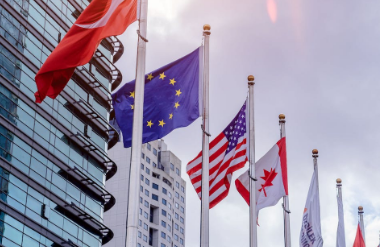The third component of an intense diplomatic week begins today with the arrival of Chinese President Xi Jinping on an official visit that has been described by Cabinet Chief Jorge Capitanich as an opportunity to "consolidate a strategic alliance."
President Xi Jinping’s visit comes just under a week after Russian President Vladimir Putin and President Cristina Fernández de Kirchner signed key agreements before they jetted off for the BRICS summit in Brazil. Nuclear energy, legal and telecommunications agreements were signed during Putin’s brief stop in Buenos Aires and China observers are expecting that further trade will be signed with the world’s second-largest economy. Furthermore, Chinese investment in the José Cepernic and Néstor Kirchner hydroelectric dams are expected to be announced.
Those same observers consider that there is still room to expand the relationship with China and further deepening of ties can be expected in the short and medium term.
China in Latin America
However, foreign relations are not limited to promoting trade and necessarily include a political component. In that respect, two Sino-Argentina specialists, Mariano Turzi, Director of the Asia Programme at the Universidad Torcuato di Tella and Jorge Malena, Director of the Contemporary Chinese Studies School at the Universidad del Salvador both agreed that there the relationship is evolving and holds promise for the future.
They both strongly differentiated China’s influence in Latin America from that of the United States and Russia. Latin America — especially in a formerly unipolar world — has been seen as the United States’ natural area of influence. In addition, the United States has recently made a point of restoring its contacts in East Asia, the most recent trip by US President Obama to Japan taking place in April.
"Russia may have an antagonistic relationship with the United States, but the US and China have a relationship based on cooperation and competition, which is very different," said Turzi. "The US and China are inter-dependent and in any case China does not have an expansionist agenda in Latin America," added Malena.
Within that context, both analysts felt that the relationship could still benefit from further development although it is not by any measure negative.
"China has the relationship with Argentina that it wants, and that is not the relationship that Argentina needs," Turzi told the Herald, while also emphasizing that "that is not to the say that the relationship is negative, just that it could be strengthened much like any other positive relationship."
In comparison with Russia for example, "China keeps a low-profile in international politics and is a pragmatist" Turzi continued. President Putin, speaking at the Government House last week praised Argentina’s "sovereign" position in various international matters and the two countries have openly criticized the United States and the United Kingdom in recent months over matters of international controversy. In contrast Turzi felt that Argentina and China had not cooperated to the same extent.
After Turzi spoke to the Herald, China signed on to a joint declaration with the Community of Latin American and Caribbean States (CELAC) calling for guarantees that restructured sovereign debt deals be respected. Argentina’s ongoing dispute with bond holdouts has put such deals at risk.
Agreeing that Chinese diplomacy tends to be pragmatic, Malena added that "we must bear in mind that despite resolving its sovereignty dispute with the United Kingdom in 1984, the People’s Republic of China still backs Argentina’s position over the Malvinas."
For Malena, the biggest obstacle is "the cultural and language distance" which had slowed down the pace of diplomatic understanding.
Trade
2014 marks the ten year anniversary since Argentina gained the status of a "strategic partner" for China, which has brought about a spike in bilateral trade and investment. Approximately US$ 16 billion in trade was conducted between the countries last year, according to figures published by the China Observatory headed by María Inés Boné that sits within the CERA exporters chamber. The same study reveals that last year imports (US$ 11.31 billion) more than doubled exports (US$ 5.51 billion), leading to a US$ 5.8 billion deficit. In comparison, Economy Ministry data reveals that in 2004 exports to China totalled US$ 2.23 billion.
Malena told the Herald that he was hopeful that during the visit Argentina’s status could be upgraded to a level only held by Brazil in the immediate region. Such an upgrade would mean increased cultural, scientific and even defence cooperation and he was confident that expanded and diversified trade agreements would be announced this weekend, weakening the reliance on soybean exports and its derivatives.
Looking down the road, Turzi said that "China is an imperative. China will be there no matter what," said Turzi about the future of Sino-Argentine relations. Asked if he was optimistic, "of course," he said, "I think that the relationship is progressing for the better."
"Before we became accustomed to Western brands, I think that in the future will be getting used to Chinese brands," concluded Malena.
By Tomás Brockenshire











